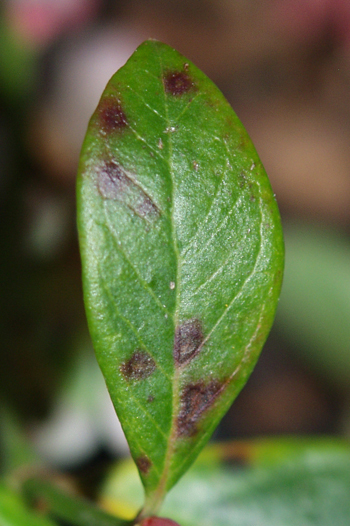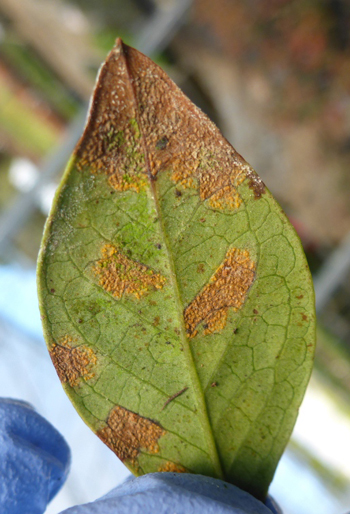Blueberry rust disease of plants
Blueberry rust is a plant disease caused by the fungus Thekopsora minima. It affects a range of plants in the Ericaceae family, including:
- blueberries
- cranberries
- rhododendrons.
Host plants
Blueberry rust is a fungal disease of a range of plants in the Ericaceae family, including:
- Vaccinium spp. (blueberries and cranberries)
- Gaylussacia spp. (huckleberries)
- Rhododendron spp. (azalea)
- Lyonia spp.
Conifer hemlocks (Tsuga spp.) are the alternative hosts that the rust requires to complete its life cycle in colder climates. These species are believed to be uncommon in Australia, but in mild climates such as Australia's the rust can survive without completing its lifecycle.
To date, blueberry rust has only been reported on blueberries (Vaccinium spp.) in Australia. Southern Highbush varieties and their cultivars are more susceptible to the disease than other varieties.
Where blueberry rust is found
In Australia as of August 2021, the disease is present in Victoria, New South Wales, Queensland and parts of Tasmania.
The disease has also been found in:
- Brazil
- Canada
- China
- Colombia
- Europe
- Japan
- New Zealand
- Peru
- South Africa
- United States of America.
Symptoms of blueberry rust

The following symptoms (see Figures 1 and 2) can indicate blueberry rust:
- reddish spots on the upper surfaces of young leaves
- these lesions darken with age, often surrounded by a yellow halo, and may merge as the disease progresses
- infected leaves might curl
- yellow pustules develop on the underside of leaves – these release spores capable of infecting other leaves and spread the disease
- you might find rust spores on other parts of the plant (such as fruit and stems) if they become dislodged from the pustules.
In severe cases, leaves can turn brown and drop prematurely. This defoliation reduces plant vigour and, in the following year, crop yield. Serious defoliation can lead to the death of susceptible cultivars.
Disease cycle

Blueberry rust has up to five life stages and produces different spores at each stage.
New pustules can be produced and release spores every 10 to 14 days, with more rapid spore production occurring under favourable climatic conditions.
The millions of spores released from the pustules spread easily. The spores can re-infect the original host plant, as well as other blueberry plants and other host species.
Spread of disease
The disease is found mainly on the leaves of infected plants. It produces millions of spores that are very easily and quickly transported on the wind, but can also be spread through:
- infected plants and fruit
- packaging
- transport vehicles
- equipment
- people's clothing and hands.
Environmental conditions
The optimum temperature for spore production is around 21°C, but new infections are unlikely when the temperature is over 30°C.
The rust can overwinter on evergreen blueberry leaves in milder climates, but is more prevalent in warm, wet conditions.
There are a number of actions that you can take to minimise the spread and impact of blueberry rust. This includes:
- monitoring for changes
- good plant hygiene
- choosing less sensitive cultivars
- chemical control.
Reporting an unusual plant insect pest or disease
Report any unusual plant pest or disease immediately using our online reporting form or by calling the Exotic Plant Pest Hotline on 1800 084 881. Early reporting increases the chance of effective control and eradication.
Please take multiple good quality photos of the pests or damage to include in your report where possible, as this is essential for rapid pest and disease diagnosis and response.
Your report will be responded to by an experienced staff member, who may seek more information about the detection and explain next steps.
Report onlineReference
CABI, 2021, Thekopsora minima, In: Invasive Species Compendium, Wallingford, UK: CAB International